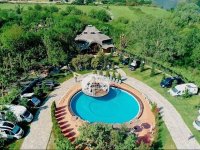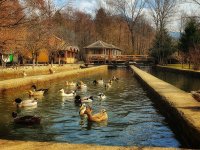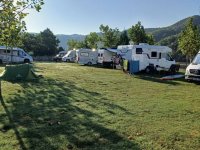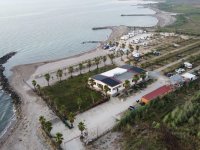Camping in Albania
4 campsites in Albania
Campsite Listing Google Map
The following consent is required:
Tracking & performance, Targeting & advertising.
Albania
With its dramatic mountain landscapes, pristine coastline, and a culture of warm hospitality, Albania is emerging as a top destination for campers seeking an authentic and affordable European adventure. Whether you're pitching a tent under the stars in the Accursed Mountains, waking up to the sound of waves on the Ionian coast, or enjoying the use of a fully-equipped campsite, Albania offers a diverse range of camping experiences.
A growing network of designated campsites is available throughout the country. These range from basic family-run sites with essential facilities to more developed resorts offering electricity, Wi-Fi, restaurants, and recreational activities.
Albania History
Albania's history is a story of invasions and resistance, from Illyrian tribes in antiquity, through Roman and Byzantine rule, to centuries of Ottoman control which ended with Gjergj Kastrioti Skanderbeg leading a resistance movement in the 15th century. Albania declared independence in 1912 but faced a tumultuous 20th century, including fascist occupation during WWII and a long, isolated communist regime under Enver Hoxha from 1944 to 1985. After the fall of communism in 1992, Albania has worked to integrate into the international community and develop its democracy and economy.
Albanian Cuisine
Albanian cuisine is a diverse blend of Mediterranean, Balkan, and Ottoman influences, characterized by fresh, seasonal ingredients like vegetables, dairy, and olive oil, with regional variations such as coastal seafood and northern meat-and-vegetable dishes. Key dishes include Byrek (a savory pastry), Fërgesë (a baked dish of peppers, tomatoes, and cheese), and Tavë Kosi (a national dish of lamb and rice baked in yogurt). Fresh yogurt (kos), grilled vegetables, and various meat and seafood specialties are common, while desserts like Trileçe (a three-milk cake) and Baklava are also popular.
Northern Albania
Northern Albania, a land of breathtaking mountain landscapes, ancient traditions, and warm hospitality, offers a captivating European adventure off the beaten path. This region, dominated by the formidable Albanian Alps, also known as the Accursed Mountains, is a haven for hikers, culture enthusiasts, and anyone seeking an authentic and wild travel experience. From the vibrant city of Shkodër to the remote mountain villages of Theth and Valbona, Northern Albania promises an unforgettable journey into a unique corner of the continent. The true heart of Northern Albania lies in its dramatic mountain ranges. The Accursed Mountains, with their jagged peaks, deep valleys, and pristine rivers.
Central Albania
Central Albania, the heart of the nation, is a region where the vibrant energy of modern city life seamlessly intertwines with a rich and layered history. From the bustling capital of Tirana to the ancient port city of Durrës and the historically significant town of Krujë, this diverse landscape offers a compelling journey through time. Flanked by the Adriatic Sea to the west and rising into the Skanderbeg Mountains in the interior, central Albania is a microcosm of the country's captivating allure, boasting ancient ruins, stunning natural parks, a unique cultural heritage, and a burgeoning culinary scene.
Southern Albania
The geography of Southern Albania is dominated by the Ceraunian Mountains, which dramatically plunge into the Ionian Sea, creating a spectacular coastline known as the Albanian Riviera. This stretch of coast is famed for its secluded coves, pristine pebble beaches, and crystal-clear waters. Inland, the landscape transforms into rolling hills and fertile plains, carved by rivers like the Drino and Vjosa. The region is administratively divided into five counties: Berat, Fier, Gjirokastër, Korçë, and Vlorë, each boasting its own distinct character and attractions.
From the pristine beaches of the coast to the stone cities of its heartland, Southern Albania offers a diverse and unforgettable travel experience.
At a Glance
Capital: Tiranë
Climate: Albania features three climate zones: a Mediterranean climate on the coast with mild, wet winters and hot, dry summers; a continental climate in the interior, characterised by colder winters and warmer summers; and a mountain climate in the north-east, with very cold, snowy winters and cooler summers.
Language: Albanian-Spoken by almost 98% of the population of Albania. There are two main spoken dialects of Albanian, southern Tosk and northern Gheg
Telephone: The country code is 00 355.
Currency: Albanian Lek (The euro is widely accepted in Albania, although it has no formal approval)
Banks: Mon-Fri 08.30-15.00 with some variations in larger cities.
Shops: Mon - Fri, 08:00 - 17:00
Public Holidays:
- New Year
- Easter Monday
- Summer Day - 14 March
- Labour Day -1 May
- Mother Teresa Day- 5 September
- Alphabet Day - 22 November
- Independence Day - 88 November
- Liberation Day - 29 November
- National Youth Day - 8 December
- Christmas 25 / 26 December
Emergency Services: 112
Driving In Albania
Driving in Albania requires awareness of unpredictable, often chaotic local driving styles, where traffic rules are frequently disregarded, particularly in cities. Drivers should be prepared for unexpected behaviours like driving on the median and rapid overtaking. Parking can also be challenging in tourist areas, and adherence to speed limits is crucial, as police often issue on-the-spot fines to foreign drivers.
Drive on the Right: Like most of Europe, Albania drives on the right-hand side of the road.
Unpredictable Traffic: Be prepared for drivers who do not always follow traffic rules, especially in cities like Tirana.
Defensive Driving: Expect drivers to take available gaps, drive on the median, and pass whenever they can.
Road Quality: Highway quality is good, but rural roads can be poor and may become rough dirt tracks.
Mountain Roads: Many roads, particularly in tourist-frequented areas like Saranda or in the mountains, are curved with sharp bends.
Driving Rules & Regulations
Seatbelts: Wearing seatbelts is compulsory for all occupants.
Speed Limits: Be aware of the speed limits, as police may issue fines, particularly to foreign drivers.
Cities: 40 km/h
Rural/Main Roads: 80-90 km/h
Motorways: 110 km/h
Blood Alcohol Content (BAC): The legal limit is very low at 0.01%.
Mobile Phones: Using a handheld mobile phone while driving is illegal and will result in an on-the-spot fine.



